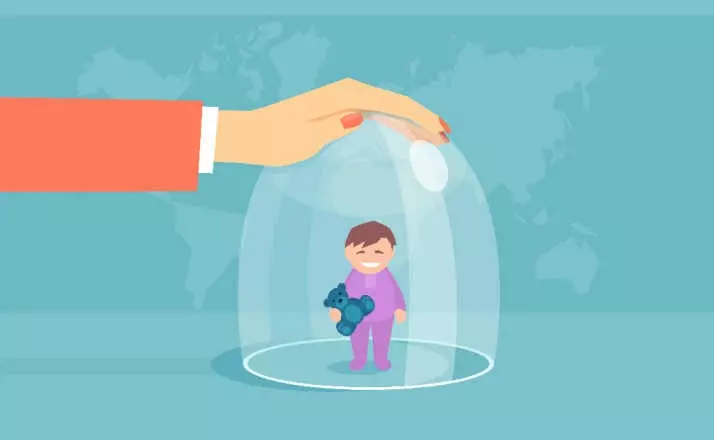My parenting style can be best described as a hybrid mashup—a combination of authoritative, authoritarian, and permissive. But if one parenting style was to surface and all others sink, at the end of the day I would emerge a predominantly helicopter parent.
The term “helicopter parenting” was coined back in 1990 by child development researchers Foster Cline and Jim Fay in their book, Parenting With Love and Logic.
Helicopter parents, according to the official definition, take an overprotective or excessive interest in the life of their child or children.
Most helicopter parents are guilty of rescuing their children, rather than giving them freedom and autonomy.
“They’re forever running lunches, permission slips, band instruments, and homework assignments to school,” the authors wrote at the time.
In an updated version of their book, they go on to say,
“These parents are obsessed with a desire to create a perfect world for their kids…one in which they never have to face struggle, inconvenience, discomfort, or disappointment.”
These are legitimate observations. But like most things in life, one-size doesn’t fit all.
Based on my own experience, here are 6 truths about helicopter parents:

The whole “hover’ thing adjusts for altitude and attitude.
I don’t always hover. I mean, I do, A LOT, but, true to definition, my hovering tends to fluctuate with challenges and discomfort.
I hate to see my children struggle, so I have a tendency, like most helicopter parents, to swoop in at any sign of difficulty or distress.
I don’t immediately try to fix anything, but I will offer my unsolicited guidance and feedback before the helicopter flies again.
In this way, I like to think that I’m being more supportive than hovering. I don’t rescue, as much as I guide. Although we get a bad rap, I think this is the case with many helicopter parents.
Helicopter parents were once free-range kids.
I don’t know how I survived my childhood. After breakfast, the door was wide open. I could come and go at will, so long as I was home for lunch and returned for dinner. Today, it’s called free-range parenting.
Back then, I was just another latchkey kid.
With so much freedom, I emerged full of street smarts and developed a strong sense of independence. I was creative, resourceful, and confident, but I craved more guidance and undivided attention.
Out in the great wide open, I frequently thought I’d be abducted by someone driving a white van, never to be seen again. How long would it take for anyone to realize I was gone? I guess this is one of the reasons I hover. I like to know my kids are safe and supported.
Disorganization often presents as parental over-involvement.
There’s a reason many helicopter parents are constantly running forgotten things to school. It might look like we’re picking up the slack for our kids, when, in truth, we are making up for our own lack of organization.
Of course, we all want to raise responsible children. However, the expectations can only be as high as the chaos allows. When adults create a chaotic environment, whether due to work or other responsibilities, things fall through the cracks.
Helicopter Parents are responding to “an increasingly unhinged environment.”
According to the book Love, Money and Parenting: How Economics Explains the Way We Raise Our Kids, Helicopter Parents are hyperfocused on economic equality for their children calling it a response to an increasingly unhinged environment.
In other words, the intensity of parenting lines up very closely with economic inequality. While this might be true for some Helicopter Parents, others, like me, are focused on the actual unhinged environment—the climate crisis, global unrest, and so on.
Most parents have a primal protective instinct. In the past several decades, with more threats and dangers facing our kids, this instinct has kicked into overdrive for some parents. You can call us overprotective.
I call us looking out for their safety and the security of their future.
Contrary to popular stereotypes, Helicopter Parents are not hysterical or illogical.
I want to make this perfectly clear: I choose to spend more time with my children, more than other parents might spend with theirs.
I’m not acting on some uncontrollable impulse to smother them. I’m not hysterical or illogical. Most of my parenting choices are based on experience (I’ve been parenting since 1991) and outcomes.
And a genuine desire to be involved in my children’s lives.
At the end of the day, Helicopter Parents are like every other type of parent.
Here’s the reality: there is no one right way to be a parent and one parenting style is not necessarily better than another.
Most days, no matter which style we employ, we’ve convinced ourselves we’re not good enough. If we don’t immerse ourselves in our children’s lives, we are bad parents.
When we do immerse ourselves in our children’s lives, we are bad parents.
Just be there for your kid. Support. Encourage. Hover, if you must. But love them with all that you have and can give.











